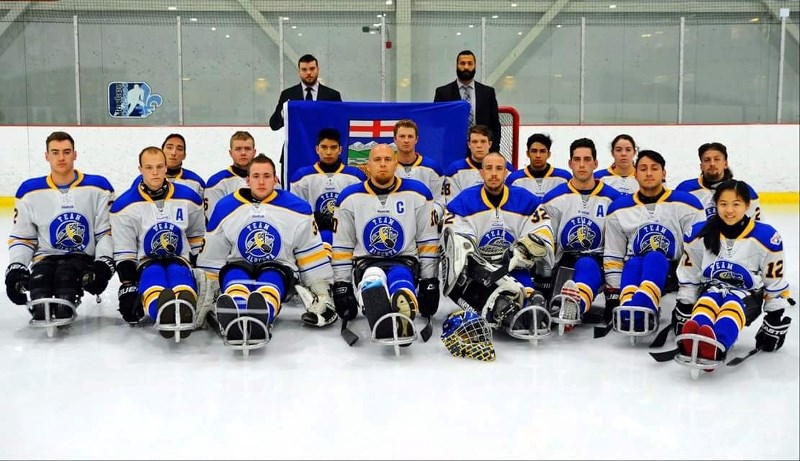If anyone had told a younger Jeremy Hall, bound in a wheelchair and later, leg braces, that he would go on to become a national gold-medal winning hockey player, he wouldn’t have believed it.
“When I was in the wheelchair, I was told at one point I wouldn’t walk until I got full knee replacements, that I would be in a wheelchair until I was 18,” he said, recalling his doctor looked at him, and said, “All right, let’s prove them wrong.”
That’s exactly what Hall, at 25, has done, defying expectations and going on to become a member of Alberta’s sledge hockey team, this year’s national champion.
“To be someone with severe hemophilia, and win, to be a national hockey champion in Canada, it’s incredible. It’s not something I think anyone would have ever thought is possible,” he said. “It’s certainly very important in that respect – blazing a new trail in what can be done, can be expected, what’s possible in living with a bleeding disorder.”
Growing up in St. Paul, hockey was always a huge passion for him, as his friends and family ate, breathe and lived the sport. But Hall, who was born with hemophilia - a genetic disorder that impairs the body’s ability to make blood clots – wasn’t able to play the sport himself in his younger years. The hemophilia led to a number of injuries and fused knee joints; at eight, he was in a wheelchair, which he would stay in for the next couple of years, watching the sport from the sidelines.
“I had all the desire in the world to play hockey. To watch my brother, I dreamed or wished that I could play too,” he said.
However, his treatment course proved to be successful, and got him to the point where he wasn’t getting as many injuries, and where it was possible for him to play shinny. His dad also began a pond hockey program as a non-contact alternative. But still, playing hockey posed a risk of bleeding.
“It was difficult, because we could have easily allowed him not to do any activity,” said his mother, Gisele. “But we didn’t want a miserable child. We wanted him to be active, and see the importance of being active.”
When he first wanted to skate, she and her husband told him he couldn’t, because he had to be able to bend his knees. On his continued insistence, they bought him a pair of cheap skates to practice in their backyard rink.
“He’s proven us wrong a few times . . . he skated for an hour,” his mother recalled. “When he wanted to do something, he did it. We’re pretty proud of him.”
Throughout his younger years, Hall wore cumbersome and uncomfortable knee-ankle-foot orthotics at all times. He focused on exercise, and strengthening his legs, to the point that eventually, he could discard them.
After Hall’s high school graduation, he left for school in Edmonton to pursue a degree in mechanical engineering at the University of Alberta.
When he heard about an opportunity to play sledge hockey in Edmonton, a sport meant for people with lower body disabilities, he thought it would be a fit. The sport is played on sleds, with players – who may have various disabilities from being paraplegic, amputees or having spina bifida - balanced on their sled blades.
“Playing sledge hockey, you eliminate the aspect that was inhabiting me most. It really allowed me to use my understanding of the game, and my athleticism to play at a more competitive level.”
While it may have eliminated the need to use his legs, sledge hockey didn’t reduce the risk of bleeding as a result of his hemophilia, as he explains, “The physicality is even greater, especially because with sled hockey, when you’re going in for hit, there’s the potential to get hit by the metal frame.”
His talent and potential was spotted by his coach, Steve Arsenault, a member of Canada’s national team, who encouraged Hall to try for the provincial team. Hall tried out last October, and made the team, balancing his commitment to the sport with work on his Masters’ degree in biomedical engineering.
On May 11 to 14, the team traveled to Boucherville, Quebec for nationals, where the team strove for its second consecutive gold medal.
“It was an extremely great experience to play at that level,” said Hall, noting the game was fast, physical, with players vying for a chance to show off their skills and get on the national team. While Hall said his sledge hockey skills didn’t necessarily match others on the team, being bigger and stronger offered him a chance to contribute to the physicality of the team, in a blend of centre/wing position.
Beating the home team, Quebec, in the final by 3-0 to claim the gold was the icing on the cake.
“It was an amazing experience. Still I don’t know it’s settled in, because of how busy I’ve been. That feeling is amazing,” he said.
“To think I’ve come all that way, now I’m a national hockey champion, never, ever would I have thought that was possible,” he said. To him, the success comes from the success of his treatment, his commitment to strength and conditioning training, and the support of his health care team and family.
His advice is for people never to count themselves out, even when they think there’s no way out of a problem or challenge.
“You turn around and figure out how you can change your situation. You, yourself, you’re really the one who can change your situation, or own your fate, or define your path.”



